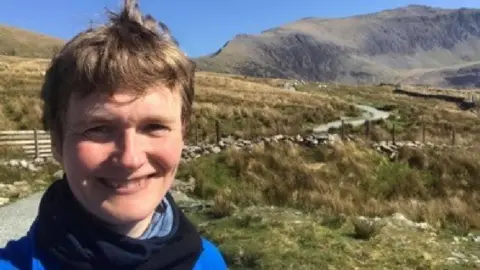Long Covid patients call for specialist clinics in Wales
People living with long Covid say access to treatment needs to improve amid calls for specialist clinics.
Paige Christopher, 25, said services were "disjointed", with specialists not "talking to each other".
Fellow sufferer Sian Griffiths, 42, said the Welsh government's £5m Covid recovery plan puts "a lot of emphasis" on GPs, with limited patient time.
The Welsh government said its recovery programme would help sufferers as close to home as possible.
Dietician Ms Christopher from Broughton, Flintshire, has been suffering with breathlessness, chest pains and palpitations for the last six months.
She has made several trips to A&E after feeling as though she was having a heart attack or a stroke.
 Paige Christopher
Paige ChristopherShe said she has not been getting better, and was frustrated about the level of support and attention available.
"I was doing exercise classes, I could walk up mountains, I was going cycling, walking, as well as working, rushing around all the time," she said.
"Now I can barely walk downstairs, and I can't clean, I can't cook, I can't shower or wash my hair by myself."

What is long Covid?
There is no medical definition or list of symptoms shared by all patients - two people with long Covid can have very different experiences, according to NHS Wales.
However, the most common feature is crippling fatigue.
Others symptoms include breathlessness, a cough that will not go away, joint pain, muscle aches, hearing and eyesight problems, headaches, loss of smell and taste, as well as damage to the heart, lungs, kidneys and gut.
Mental health problems have been reported, including depression, anxiety and struggling to think clearly, termed "brain fog" by those experiencing the symptom.

Earlier this month, Health Minister Eluned Morgan announced a programme to address long Covid, with GPs issued new guidance and diagnostic tools, as well as treatment and rehabilitation "pathways".
But the campaign group Long Covid Wales said a better approach would be to set up specialist clinics, which it said would be more consistent with expert guidance.
Ms Christopher said the current support required referrals to different specialists.
"From head to toe, there's probably about 20 different things wrong with me at the moment," she said.
"And the GP can't sort any of them out, so he can only refer on.
 Paige Christopher
Paige Christopher"Four or five referrals sent off to different places, which will be seen at different times.
"You just go around in circles. It's just that holistic approach from a specialist that's needed."
She tested positive for coronavirus in December but it was a mild dose and she felt better quite quickly.
'Serious problem'
But in January she started feeling much worse and she did not make the link with Covid until an A&E doctor suggested it.
She is now one of an estimated 50,000 in Wales with varying degrees of long Covid.
Ms Christopher has seen a cardiologist and been given some medication, which has helped with the palpitations.
But despite still having serious problems with breathlessness, she has been unable to get a chest scan.
"Overall, it just feels like no one's taking it seriously," she said.
"And it is a really serious problem, I think, for physical and mental health."
 Sian Griffiths
Sian GriffithsPhysiotherapist Sian Griffiths, 42, a member of the Long Covid Wales group, has been suffering for more than a year with heart palpitations, breathlessness and "brain fog".
"Physically I'm trying to do a little bit of exercise," said Ms Griffiths, from Llandegfan on Anglesey.
She has paid to see a private consultant in Stoke-on-Trent for treatment.
"I'm on some medication to help with the heart rate, but I can't see the light at the end of the tunnel for the brain fog," she said.
"Why are we putting the burden on to the GP who, to be fair, has 10 minutes with you?
"I don't think that's fair on the GPs, and I don't think that's fair on the people suffering with long Covid.
"I'm lucky to have a good GP, some people don't have that.
"My view is it needs a consultant-led clinic and I think the government needs to talk to people who have had long Covid.
"If you have a MDT [multi-disciplinary team] approach in one place, surely that's going to get people seen quicker and, hopefully, on the road to progression, to rehab."
 Sian Griffiths
Sian Griffiths Adrian Thomas, executive director of therapies and health sciences at Betsi Cadwaladr University Health Board, encouraged anyone in north Wales with "concerns regarding their care to contact us directly".
He said: "We are following the guidance set by Welsh government and clinical practitioners are working with patients with symptoms of long Covid to co-produce the most appropriate pathway of care.
"We also offer support for people with symptoms of long Covid to help them manage their condition as close to home as possible through our community based services.
"We have established the first long Covid education programme for patients in the UK.
"This is helping patients to self-manage their symptoms and reduce the effect on their lives.
"Many patients are also providing positive feedback that they are benefitting from the national Covid-19 Recovery App, which can be downloaded for free."
What does the Welsh government say?
The Welsh government said its Recovery-Adferiad programme "focuses on expanding the diagnosis, rehabilitation and care for people suffering with long Covid to ensure they can access the services they need, as close to home as possible".
"People who require more specialist support, which is only available from hospital-based services will be referred via their GP or healthcare professional," said an official.
"As we are learning more about long Covid, the programme will be reviewed on a six monthly basis.
"By assessing patients in primary and community care setting, it will ensure that people are only referred to services where there is a clinical need and avoid unnecessary referrals to hospital services which can add to the existing long waits for services."
'Beyond capacity' of GPs
The British Medical Association (BMA) said managing long Covid patients was "beyond the scope and capacity" of GPs.
Dr Phil White, chairman of the BMA's Welsh GPs committee, said: "The problem with expecting general practice to manage it all is… we would have to refer to a cardiologist for heart problems, to a nephrologist for kidney problems and to a chest physician for lung problems.
"So if there were in place a multi-disciplinary team that looked at the patient as a whole then this would alleviate many of the problems and the complaints.
"With such a complex picture and the increasing workload faced by GPs we want to see a service established outside of general practice to best serve patients."
